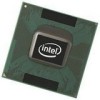Intel P8700 Data Sheet - Page 31
CMOS Signals, 3.9 Maximum Ratings, Table 5., Processor Absolute Maximum Ratings
 |
UPC - 735858206174
View all Intel P8700 manuals
Add to My Manuals
Save this manual to your list of manuals |
Page 31 highlights
Electrical Specifications 3.8 3.9 Caution: Table 5. 1. Refer to Chapter 4 for signal descriptions and termination requirements. 2. In processor systems where there is no debug port implemented on the system board, these signals are used to support a debug port interposer. In systems with the debug port implemented on the system board, these signals are no connects. 3. BPM[2:1]# and PRDY# are AGTL+ output-only signals. 4. PROCHOT# signal type is open drain output and CMOS input. 5. On-die termination differs from other AGTL+ signals. CMOS Signals CMOS input signals are shown in Table 4. Legacy output FERR#, IERR# and other nonAGTL+ signals (THERMTRIP# and PROCHOT#) use Open Drain output buffers. These signals do not have setup or hold time specifications in relation to BCLK[1:0]. However, all of the CMOS signals are required to be asserted for more than four BCLKs for the processor to recognize them. See Section 3.10 for the DC specifications for the CMOS signal groups. Maximum Ratings Table 5 specifies absolute maximum and minimum ratings only, which lie outside the functional limits of the processor. Only within specified operation limits, can functionality and long-term reliability be expected. At conditions outside functional operation condition limits, but within absolute maximum and minimum ratings, neither functionality nor long-term reliability can be expected. If a device is returned to conditions within functional operation limits after having been subjected to conditions outside these limits, but within the absolute maximum and minimum ratings, the device may be functional, but with its lifetime degraded depending on exposure to conditions exceeding the functional operation condition limits. At conditions exceeding absolute maximum and minimum ratings, neither functionality nor long-term reliability can be expected. Moreover, if a device is subjected to these conditions for any length of time then, when returned to conditions within the functional operating condition limits, it will either not function, or its reliability will be severely degraded. Although the processor contains protective circuitry to resist damage from static electric discharge, precautions should always be taken to avoid high static voltages or electric fields. Processor Absolute Maximum Ratings Symbol Parameter TSTORAGE TSTORAGE VCC VinAGTL+ VinAsynch_CMOS Processor Storage Temperature Processor Storage Temperature Any Processor Supply Voltage with Respect to VSS AGTL+ Buffer DC Input Voltage with Respect to VSS CMOS Buffer DC Input Voltage with Respect to VSS Min -40 -25 -0.3 -0.1 -0.1 Max 85 1.45 1.45 1.45 Unit °C °C Notes1,2 3,4,5 6 V V V NOTES: 1. For functional operation, all processor electrical, signal quality, mechanical and thermal specifications must be satisfied. Datasheet 31















